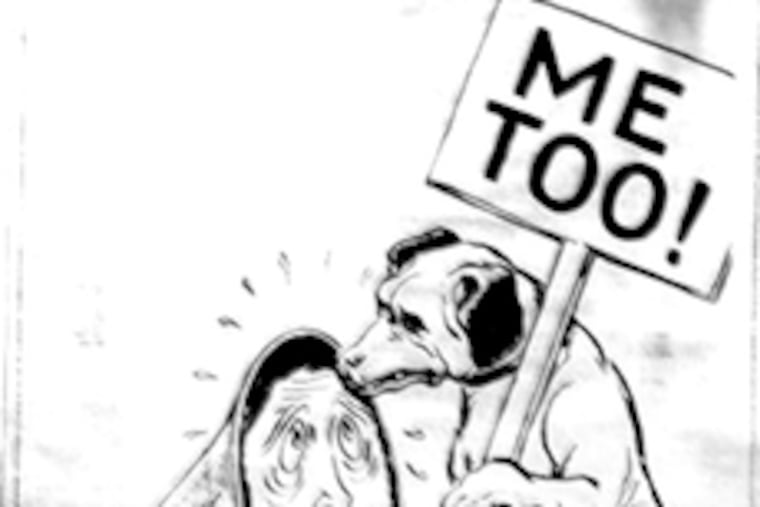An engineer whose life was poetry in free verse
Philadelphia poetry impresario Herschel Baron, 94, a mechanical engineer and a rabid, lifelong defender of the First Amendment who was fired in 1957 by RCA for alleged Communist activity, died of lung cancer Monday at the Watermark at Logan Square, where he had lived for one year.

Philadelphia poetry impresario Herschel Baron, 94, a mechanical engineer and a rabid, lifelong defender of the First Amendment who was fired in 1957 by RCA for alleged Communist activity, died of lung cancer Monday at the Watermark at Logan Square, where he had lived for one year.
The bantam retiree, a familiar character in Philadelphia poetry circles for more than 20 years, was hard to miss with his shock of white hair and beard, rakish Greek fisherman's cap, pipe (he owned 300 pipes), and tweed jacket as he walked the streets of the city. He was one of the original residents of the William Penn House, a Center City cooperative, and his home was crammed with more than 5,000 books.
Mr. Baron organized hundreds of poetry readings that drew many writers who went on to be famous, including Maya Angelou, Sonia Sanchez, Eleanor Wilner, Daniel Hoffman, David Slavitt, Gregory Djanikian and Leonard Gontarek.
Around 1980, Mr. Baron began the still-running poetry readings at Robin's Bookstore on 13th Street in Center City. He also drew enthusiastic listeners and writers to other poetry venues.
"If you had anything to do with poetry in Philadelphia, you knew Herschel. He brought old-world charm to the art," Gontarek said. "When I was awarded the poetry fellowship by the Council of the Arts, he kindly walked 15 blocks in the early 1990s to personally congratulate me. I had friends who lived close by who didn't call for weeks."
Mr. Baron made hundreds of recordings of the readings and donated them to the Kelly Writers House at the University of Pennsylvania. He also donated hundreds of poetry books, many signed, to Penn's rare-books collection.
Mr. Baron wrote his own poetry, and for years led poetry workshops in Philadelphia public schools.
He was born in Rishon le Zion in Palestine, now Israel. His parents had fled Russia to avoid his father's conscription into the czar's army. The family moved to South Philadelphia when Mr. Baron was 2.
After graduating from South Philadelphia High School for Boys, Mr. Baron studied mechanical engineering at what is now Drexel University until he was kicked out because of his radical left-wing politics. He was a gifted, self-taught engineer and had a long career with RCA in Camden.
In 1939, Mr. Baron married Ada Rosenthal, who shared his passion for politics and poetry. During World War II, he worked on the development of radar systems and drew blueprints for one of the radio towers atop the Empire State Building.
At RCA, Mr. Baron organized a union and printed strike placards with the company's dog, Nipper, stating, "Me Too!" The company sued Mr. Baron for copyright infringement.
He was fired in 1957 for refusing to testify before the Senate internal security subcommittee, which was investigating Communist activity. An arbitrator reinstated Mr. Baron under the union contract that he helped negotiate, and the Nipper suit was eventually dropped.
Mr. Baron left RCA in 1963 to work for Jacobs Machine Corp., where he designed automated sewing machines for the garment industry.
During this time he became involved in Philadelphia politics. Mr. Baron was a Democratic committeeman in Center City for many years, and in 1979 ran unsuccessfully for city commissioner on a third-party ticket opposing Mayor Frank Rizzo.
In 1971, Mr. Baron learned to drive a car to travel each day to Downingtown to his job as an engineer for Budd Co. He retired in 1980.
"Every Wednesday night Herschel indulged himself by shopping at used-book stores in Philadelphia. The average price he paid was 19 cents," Hoeber said. "He was proud to be the only person with a credit account at the old Leary's Book Store on Ninth Street.
"He had an eclectic collection including a signed first edition of F. Scott Fitzgerald's debut novel, This Side of Paradise, and a 16th-century treatise on the mathematics of a sphere."
"My father believed people should have total access to all information," said his daughter, Ditta Baron Hoeber. "He often recited the words of Edna St. Vincent Millay to express his feelings":
Turn the tattered pages,
Read me, do not let me die!
Search the fading letters,
finding
Steadfast in the broken
binding
All that once was I!
In addition to his daughter and son-in-law, Mr. Baron is survived by two grandchildren and a brother. His wife died in 2004.
A memorial poetry reading will be held at 2 p.m. Oct. 21 at the Philadelphia College of Physicians, 19 S. 22d St. His body was donated to science.